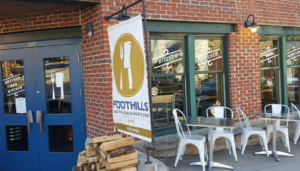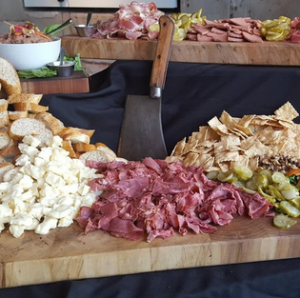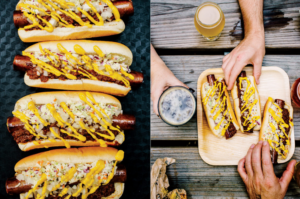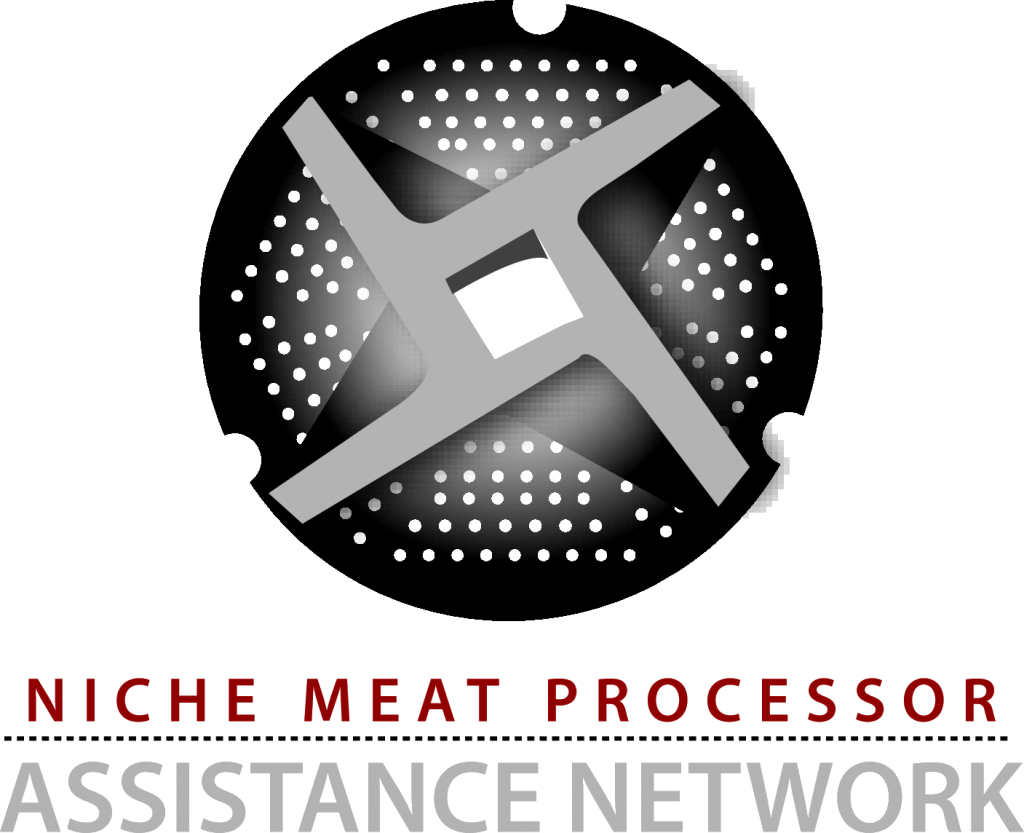Case study written in April 2018
Foothills Meats is a food-service company specializing in local and pasture-raised meats for retail and wholesale markets in the Asheville, North Carolina region. The core of their business is their food-service arm, which consists of permanent food truck, open daily at Hi-Wire Brewing’s Big Top, two new neighborhood Butcher Bar eateries, and their Catering Division, which offers a wide range of menu options for weddings and events of all sizes. Foothills also offers custom butchery, fabrication, sausages and primal cuts for wholesale buyers and home-use. Foothills meats can be purchased in bulk or bi-weekly through their Meat Share CSA program
Basic Information:
Year Established: 2002
What do they do: Foothills is a food service company specializing in local and pasture-raised meats for retail and wholesale markets and their own fast-casual restaurants, with a focus on whole-animal butchery.
# of locations and dates established: Foothills Family Farms was established in 2002. Foothills Meats was an off-shoot LLC and brand that began raising and marketing meats in 2008.
3 locations. See a succinct timeline in the sidebar of this article.
# of employees: 41
How many animals they break down weekly: 1-1.5 beef, 2 hogs a week, work with two main farms to supply animals. Slaughterhouse delivers the carcasses weekly.
Annual Sales Revenue: $1.5m, expected to rise in 2018 with new locations in operation.
Inspection: Retail Exempt
History & Development:
Co-founded by former pastured livestock producer Casey McKissick. He and his former partner (who also farmed with him) were frustrated by not getting the kind of processing they needed to market their pastured meats. Very little options for value-added products especially. They wanted a physical location to sell meat 7 days a week instead of at just a couple farmers markets a week. Started with a whole-animal butcher shop with a retail counter in Black Mountain, a small town to the East of Asheville. The location was cheap but the accessibility was not ideal so retail sales were not enough to justify keeping the store open to the public after 1.5 years. The company was developing its food-service arm in nearby Asheville so McKissick converted the space to serve as a commercial kitchen and commissary to serve an experimental deli inside a downtown bodega the now successful permanent Food Truck in Asheville at Hi Wire Brewery. The deli and the food truck enabled McKissick to test menus, the market and financial assumptions for 2 years while he built the business model for the current Butcher Bar concept. It was of primary importance to maintain the whole-animal approach to sourcing meats.
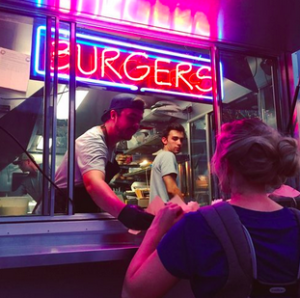 At the central commissary in Black Mountain where they do the carcass breakdown, they always have RTE and deli products in various stages to adjust inventory levels in the retail stores within 12 hours. With the addition of value-added products, wholesale, catering, 2 restaurants and a food truck, they always have somewhere for meat to go. This results in nearly zero meat/ bone/ fat waste.
At the central commissary in Black Mountain where they do the carcass breakdown, they always have RTE and deli products in various stages to adjust inventory levels in the retail stores within 12 hours. With the addition of value-added products, wholesale, catering, 2 restaurants and a food truck, they always have somewhere for meat to go. This results in nearly zero meat/ bone/ fat waste.
The Butcher Bars are located in West Asheville and Black Mountain and have a small menu of comfort foods as well as a few more refined dishes, a full beer, wine, liquor bar, and a small retail butcher case featuring some of the most commonly purchased fresh meats and house made deli products. If meat has sat in the case for more than a day, it gets used in cooked products in the kitchen so there is no waste.
Meat Sourcing:
They have long standing agreements with their core farmer suppliers, with weekly standing orders. They try to give them a few months notice if production needs to increase. At the time of this interview, Foothills was breaking down one steer and one pig a week but expected that to increase once the new Butcher Bars got started. They are fortunate to have a slaughterhouse nearby that will also deliver the carcasses to their Black Mountain commissary for butchering.
Three farms supply Foothills at this time. Casey also used to raise animals for the butcher shop, but had to retire that business a few years ago to focus on the butchering business and restaurants.
Funding Sources:
Initial financing was personal savings on the part of the owners, friends and family loans. The initial commissary/retail shop cost around $80,000 to start-up in 2013. The latest round of growth from September 2016 to March 2018 was over $450,000.
The final project from this period was to move the original commissary and butcher shop to a new location beside the Black Mountain Butcher Bar and restaurant. A window behind the bar allows restaurant guests to view butchers working and a small public area is available for customers to watch meat being cut and hot dogs being made.
Business Components:
Have a full-time logistical coordinator who moves meat and product who is probably going to get really busy with all these moving parts. They “sell” meat between departments to track the different values and COGS.
Central Kitchen/Commissary (Black Mountain Commercial Kitchen). Tried doing retail sales at this location, but that did not pan out. Went back to just being a commercial kitchen. Commissary is now moving next door to the Butcher Bar in Black Mountain. This will allow patrons in the restaurant to actually see the butchering taking place next door.
Butcher Bars- fast casual, neighborhood restaurants with nostalgic, comfort-food oriented menus. There will be a 4 foot meat case in each restaurant with a core selection of heavy moving cuts, will use the product on the menu as needed (also have catering and food truck to move it if needed). They expect the core of the menu to be regular crowd pleasers and the rest will be rotating specials centered around their whole-animal philosophy and giving people new things to try. They will also utilize local produce and other locally-grown ingredients.
Also do catering and a mixed meat subscription program (called Honest Meat Boxes) as well as a food truck at HiWire Brewing in Asheville.
From a profit margin perspective, the best margins seem to be the catering, then restaurants, then food truck. Worst margins seems to be the meat CSA.
The Road Ahead:
-their chili dog was recently featured in the popular Southern magazine “Garden & Gun”
-building a new central butcher space next to Butcher Bar in Black Mountain. Will be a larger space and also allow restaurant patrons to see the butchering in action.

